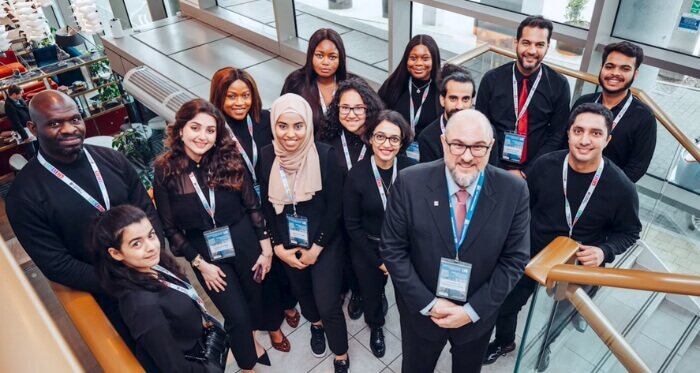Participating in a conference is one of the best ways to learn something new, meet professionals, and stay updated with trends. There are many types of conferences people can attend, like business, health, education, or tourism-related events. Among all, hospitality and tourism management conferences are known for offering rich industry insights, making many people ask, What is a conference in hospitality and tourism management?
A conference in hospitality and tourism management is a professional event where experts, researchers, and learners come together to share ideas and experiences. It covers important topics such as sustainable tourism, customer service, new technologies, and global travel recovery. These conferences often include speeches, workshops, and open discussions that help attendees grow professionally and personally.
Are you curious about how they can help you in real life? Keep reading, because this article explains everything you need to know in a simple and clear way.
What is a Conference in Hospitality and Tourism Management?
Conferences in hospitality and tourism management bring together people from academia, research, and industry to exchange practical knowledge and experiences. These events highlight key themes such as sustainable practices, customer service growth, and the impact of technology on business operations. Attendees also gain valuable opportunities to build meaningful professional connections that support both academic and industry growth.
The program usually includes keynote speeches, workshops, and presentations that cover current challenges and practical approaches to problem-solving. Participants often attend to share their studies, research, or insights while also learning how others respond to industry needs. People’s expectations from Hospitality and Tourism Management Conferences are to find innovative solutions, build wider networks, and gain strategies that can be applied effectively.
By attending, students, teachers, and professionals find a welcoming space where ideas and knowledge are shared freely for future improvements. The interaction between academics and business leaders creates useful conversations that drive forward meaningful changes in hospitality and tourism practices. In the end, these events inspire fresh thinking while creating stronger cooperation across global tourism and hospitality communities. Below are some of the main topics discussed at these conferences:
Sustainable Tourism
Sustainable tourism is one of the most popular themes at these conference tourism events. Experts talk about ways to reduce environmental harm while boosting economic growth. Discussions often highlight eco-friendly hotels, responsible travel practices, and conservation projects in different parts of the world. The goal is to make tourism a long-term benefit without harming communities or natural resources.
Customer Experience
Improving customer experience is another central topic. Speakers share strategies on how hotels and travel services can make visitors feel valued. Ideas include personalized services, better staff training, and faster problem-solving methods. The focus is always on making guests happy so they return again.
Hotel Technology
Technology in hotels is widely discussed at hospitality industry conferences because it keeps changing how services are delivered. Topics often include smart rooms, online booking systems, and the use of mobile apps. Many sessions highlight how technology can save time and improve guest satisfaction. It also helps businesses work more smoothly behind the scenes.
Travel Recovery
Conferences also focus on travel recovery, especially after tough global challenges. Presenters explain how countries and businesses rebuild trust in travelers. They talk about health safety, flexible booking, and rebuilding customer confidence. These discussions help industries bounce back stronger after setbacks.
Tourism Marketing
Tourism marketing is always an engaging subject. Professionals share new ways to attract visitors using social media, storytelling, and online campaigns. They also discuss how branding can shape a country’s or city’s reputation. Effective marketing helps destinations stand out in a highly competitive global market.
Service Innovation
Innovation in services is another important theme. Experts share ideas on creating new experiences that make travelers feel excited and cared for. Examples include unique dining options, themed stays, or special cultural programs. Service innovation helps businesses stay fresh and attract new groups of travelers.
Industry Collaboration
Collaboration between different sectors also takes the spotlight. Travel agencies, hotels, governments, and local communities all play roles in shaping the industry. Speakers often highlight the importance of teamwork to solve challenges like sustainability and growth. These sessions encourage stronger partnerships that benefit everyone involved.
Future Trends in Hospitality and Tourism You’ll Hear at Conferences
Conferences in hospitality and tourism are not only about today’s ideas but also about what is coming tomorrow. These events highlight exciting topics that change how the industry grows and serves people. Speakers and experts predict what will shape the next big discussions. Let’s take a closer look at some future themes you are likely to hear more about.
Smart Guest Services
One of the strongest topics will be smarter services for guests. Hotels and travel companies will look for new ways to simplify check-ins, bookings, and personal requests. Digital tools and systems are becoming part of everyday service to reduce waiting times. The main idea is to make guests feel comfortable and valued with quick, personalized support.
Eco-tourism Growth
Eco-tourism will likely stay an important theme at future conferences. People want travel that cares for nature and supports local communities. Many talks use examples from conferences in Canada to show how eco-friendly hotels and green travel ideas work in practice. Presentations often explain ways to protect forests, wildlife, and cultural traditions in simple and practical ways. This trend is about enjoying travel while keeping the environment safe.
Virtual Reality Planning
Virtual reality will become an interesting subject in future events. It can let travelers explore hotels or destinations before booking them. This helps people make better choices and feel more confident about their plans. Discussions will show how this technology creates exciting previews of travel experiences.
Contactless Travel
Another trend will be contactless systems for travel. Touch-free check-ins, digital keys, and cashless payments are becoming more common. These methods are safer, faster, and more convenient for travelers and staff. Future conferences will highlight how these systems improve safety and comfort during trips.
Personalized Travel Offers
Personalized travel will get much attention in the coming years. Businesses will use data to create packages that match a traveler’s exact interests. This might include favorite activities, dining choices, or cultural experiences. The goal is to make trips unique and memorable for every person.
Wellness Tourism
Wellness-focused travel is expected to grow quickly. Conferences will cover topics like spa retreats, fitness-based travel, and mental health packages. These experiences focus on helping people relax, heal, and recharge during their travels. Wellness tourism will become a powerful way to connect relaxation with exploration.
How to Prepare Before Attending a Hospitality and Tourism Conference?
Attending a hospitality and tourism conference can be exciting, but proper preparation makes the experience even more rewarding and useful. Good planning helps you learn, connect, and enjoy the sessions. Here are some simple but effective tips to prepare before you go.
Research the Speakers
Take time to learn about the speakers before the conference begins. Knowing their background helps you understand their sessions better. You can also prepare questions about events in the tourism and hospitality industry to ask them during discussions. This makes your conversations more meaningful and shows your interest.
Prepare Elevator Pitch
An elevator pitch is a short introduction about who you are and what you do. Keep it clear, simple, and easy to remember. Practice it so you can confidently share it when meeting new people. A good pitch often creates strong first impressions.
Print Business Cards
Business cards are still very useful at professional events. Carry enough cards to share with people you meet. Make sure your contact details are correct and easy to read. Handing a card shows professionalism and makes it easier to stay connected.
Download Event App
Many conferences now use event apps to share schedules, updates, and maps. Download the app in advance and explore its features. It helps you stay organized and not miss important sessions. Apps also allow easy networking with other participants.
Plan Your Schedule
Review the conference program carefully and choose the sessions most important for your goals. Planning ahead saves time and avoids confusion during the event. It also ensures you attend the talks and workshops that matter most. A clear plan keeps your day smooth.
Dress Professionally
The way you dress has an impact on how people see you. Choose neat, comfortable, and professional clothing for the event. Good dressing makes you feel confident while showing respect for the occasion. First impressions often start with appearance, so dress wisely.
Are Conferences in Tourism and Hospitality Management Suitable for All?
Conferences in tourism and hospitality management attract people from many areas who want to share knowledge, discuss new trends, and learn. These gatherings bring together experts, professionals, and learners to exchange ideas that help shape the tourism and hospitality industries. Everyone has the chance to build skills and expand networks through discussions, presentations, and useful activities.
These events cover topics like customer service, sustainable practices, and the latest technology used in hotels and travel services worldwide. Many attendees of hospitality and tourism management conference gain chances to meet experienced experts, connect with peers, and gather valuable strategies. Sessions provide an excellent way to understand both challenges and opportunities in the field.
For professionals, these conferences open doors to fresh ideas, while beginners discover new opportunities and guidance for their future. Students, entrepreneurs, and young professionals benefit from interactive workshops and inspiring talks given by industry leaders. Such events create a space where everyone can participate, learn, and contribute to the wider hospitality and tourism community.
Tips for Staying Updated on Hospitality or Tourism Conferences
Keeping up with hospitality and tourism conferences can feel tricky, but there are simple ways to stay informed. These events happen around the world and often share details through different platforms. By using the right sources, you’ll always know what’s coming. Let’s look at some helpful ways to stay updated on upcoming conferences and events.
Follow Official Websites
Most big conferences have their own official websites. These sites share details about dates, schedules, and speakers. Visiting them regularly helps you catch updates early. It’s one of the easiest ways to track upcoming events.
Use Social Media
Platforms like LinkedIn, Facebook, and Twitter often highlight upcoming conferences. Organizers post news, updates, and live coverage before and during events. Following these accounts keeps you updated without extra effort. Many professionals also share details you might otherwise miss.
Subscribe to Newsletters
Many organizations offer free newsletters with regular updates about future events. Subscribing to these gives you direct information in your inbox. Newsletters often include exclusive announcements or discounts. This makes them useful for staying aware of new opportunities.
Join Professional Groups
Online groups or associations related to hospitality and tourism are a great source of updates. Members share details about upcoming conferences and activities. These groups also allow you to ask questions directly. Being part of such networks keeps you better connected.
Download Event Apps
Some conferences have their own apps with schedules and announcements. Downloading them early helps you plan ahead and avoid missing important sessions. Apps also sometimes allow networking before the event. It’s a smart and easy way to stay updated.
Set Alerts Online
Search engines allow you to set alerts for specific topics. By setting one for “hospitality conferences,” you’ll receive notifications. This saves you time by bringing updates straight to your email. It’s a helpful tool for busy professionals.
Frequently Asked Questions
Hospitality and tourism management conferences raise many questions for those planning to attend or curious about what happens there. People often wonder about the benefits, the audience, and the opportunities these events create. To make things clearer, here are some commonly asked questions with detailed answers.
What Makes These Conferences Different From Regular Meetings?
Hospitality and tourism conferences are designed to bring together people who work in or study these fields. These events usually include talks, presentations, and workshops. What makes them unique is the strong focus on real-world service and travel challenges. They are more practical and industry-based compared to regular meetings.
Who Usually Hosts These Conferences?
These conferences are often hosted by universities, tourism boards, industry associations, or international organizations. The host usually brings in expert speakers and sets the event agenda. They make sure the topics are useful for a wide audience. A good host adds value to the learning experience.
Can Small Business Owners Attend?
Yes, many small business owners attend to learn about industry trends and new ways to grow their services. It’s a great way to meet larger companies and experts. Small businesses often benefit from hearing about affordable solutions. Many find helpful contacts and ideas during these events.
Are All Conferences Held in Person?
No, some are fully online while others are hybrid. Hybrid events allow you to attend in person or from your computer. Virtual conferences became more popular recently because of global travel concerns. Both formats offer good learning and networking options.
What Should I Carry to the Event?
Bring business cards, a notebook or tablet, your conference pass, and a water bottle. Some like to carry a printed schedule as well. It helps to review speaker names before the event. Being prepared makes the day more useful and less stressful.
Do You Have to Speak or Present?
No, most people attend just to listen, learn, and network. Only selected individuals speak or present their work. You can choose to apply as a speaker if you have something to share. Otherwise, enjoy the learning experience from the audience.
How Are Topics Selected for the Conference?
Organizers usually choose topics based on current trends, challenges, and new ideas in the industry. Sometimes they also collect input from past attendees. The goal is to make the event relevant and useful. Good conferences update their topics every year.
Bottom Lines
Conferences in hospitality and tourism are more than just events; they are meaningful platforms where ideas meet opportunities and spark change. They bring together people with different experiences who share knowledge, inspire growth, and create lasting connections in the industry. These gatherings show the value of learning together.
When people ask what is a Conference in Hospitality and Tourism Management, the answer goes beyond presentations and talks. It is about exchanging practical solutions, exploring new strategies, and understanding how challenges can turn into opportunities. Every participant leaves with stronger skills and broader perspectives.
These conferences continue to shape the future of global hospitality and tourism. By joining, you become part of discussions that guide progress, strengthen partnerships, and open doors to new possibilities.








